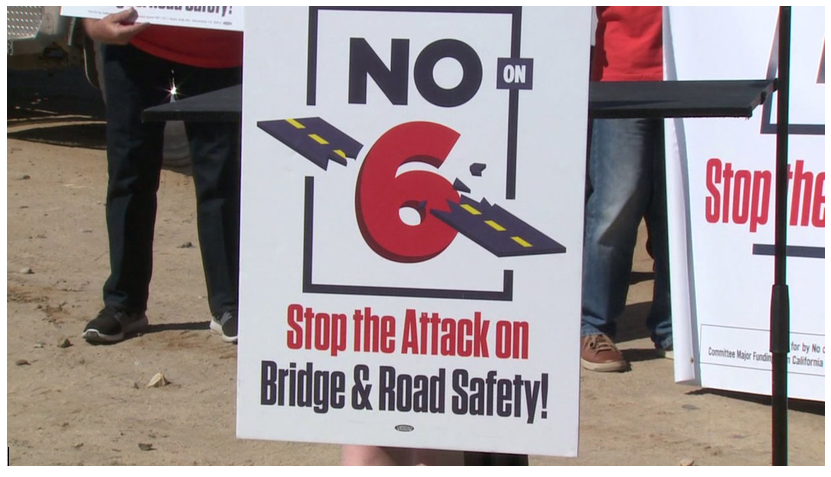CommentsTRANSIT TALK-It is no secret that Proposition 6 -- repealing the recently enacted increase in the gas tax and car fees -- is a Trojan Horse being used to increase voter turnout for the November 6, 2018 election for electing John Cox, the Republican candidate for Governor.
I have no issue with paying more for gas because our state’s roads are in a dangerous state of disrepair; they are costing me money in car repairs and maintenance.
The bad roads have resulted in increased tire wear and damages to my car’s suspension and steering mechanisms, to name just two of the expenses I’ve recently paid for. I just had to have an alignment done and discovered I needed to replace my tires due to uneven wear. And with the potholed, rutted, broken roads still there, another alignment will probably be needed soon.
The damages to vehicles from bad road conditions represent a cost to taxpayers. Police, Fire, and Emergency vehicles drive the same roads as I do, but since I ride buses and trains more frequently than I drive, and since these vehicles are driven more, they are subject to more damages from the bad roads.
When Police, Fire, and Emergency vehicles suffer increased damages, and increased cost of maintenance means our tax dollars are spent more quickly. This requires increasing government budgets to cover maintenance that would be less necessary if our roads were in better repair.
The bad roads also increase wear and tear on commercial vehicles, particularly trucks, adding costs that are then passed along to consumers, raising our cost of living.
The Republicans’ spin on TV, radio (I listen to conservative radio programs to try to understand their mindset), and in articles include assumptions flying through the air and print, hoping something will stick, true or not.
There are charges that the money raised by the new taxes will not be used for the intended purposes of road repair and maintenance, yet not one mentions the recent voter approved Prop 69 which blocks lawmakers from raiding gas taxes.
There is speculation the money will be used to pay for government employee pensions (again, see Prop 69).
I was under the impression that a core Republican philosophy is paying one’s fair share. This would include paying for the damages your vehicles do to the roads. The math is simple: the less you drive, the lighter the vehicle, or the better gas mileage, the less the gas tax affects a driver.
Moreover, folks who support repealing the gas tax say it costs drivers over $700 per year. A recent letter from an LA Times reader did the math, stating that such an expense would require buying 5,833 gallons of gas a year. If driving a vehicle that averages 20 miles per gallon, this means (to reach the $700 figure) a driver would have to drive 116,000 miles a year, or over 9,700 miles per month. A more typical cost for an average driver who drives 1,000 miles a month in a car that averages 20 miles per gallon would be an extra $6 per month, or a $72 per year increase.
The large, heavy SUVs, luxury cars, muscle cars, and pickup trucks put more weight on the roads making them wear faster, resulting in the need for more frequent road repair.
This is particularly true with muscle cars and high-end pickup trucks whose very large motors create tremendous torque for the tires to spin, causing road damage to occur even faster. In the Republican world of paying one’s fair share, why should I, being an infrequent driver with a lighter car, must pay for those who drive much more and whose vehicles are built to place more stress on the roads?
The repeal of Prop 6 is dangerous because the critically needed repairs to infrastructure -- particularly bridges and overpasses -- will be delayed if not postponed. When the next earthquake strikes, this inferior, dangerous infrastructure will be more prone to damage and collapse. Think of that when you are sitting in your vehicle under a bridge or freeway overpass with tons of concrete overhead that could collapse and crush everything underneath. Or imagine being on top of such structures when they collapse with you inside your vehicle.
Should we be lucky enough to avoid being under or on a bridge or freeway overpass when a collapse occurs due to delayed maintenance and the repeal of the gas tax, the state’s economy will still be badly damaged. With roads impassable, getting to work will take longer. Goods and services will be delayed and cost more. And emergency vehicles will take a longer time to respond.
(Matthew Hetz is a Los Angeles native. He is a transit rider and advocate, a composer, music instructor, and member and president and executive director of the Culver City Symphony Orchestra.) Edited for CityWatch by Linda Abrams.
Tags:

















